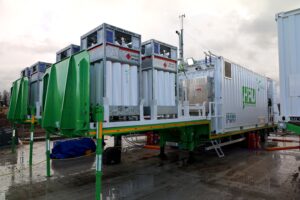Highway and transport companies could soon benefit from an even greener fleet in the future after news that the Department for Transport (DfT) and the Department for Business Energy and Industrial Strategy (BEIS) announced that the automotive industry is set to benefit from a £73.5 million government investment to develop green technologies and safeguard jobs.
Ten projects across the UK will receive a share of this new investment to develop cutting-edge technology for the next generation of electric taxis, cars and vans, including recyclable batteries, advanced electrical systems and ultra-lightweight components.
This funding will contribute to the automotive sector’s recovery from the coronavirus pandemic by safeguarding more than 14,000 UK research and manufacturing jobs. It will also enable the manufacture of a greater volume of low emission cars, commercial vehicles and components right here in the UK, according to the government departments.
Business Minister Nadhim Zahawi said: “Whether it’s researching future battery design or creating a lightweight version of the Ford Transit, companies in every part of the United Kingdom are leading the world in advanced automotive technology. Not only will this funding ensure automotive companies can play their part in keeping us on the path to net zero emissions by 2050, it will also support thousands of jobs and be a welcome step towards the industry’s economic recovery.
“The funding boost will aid the development of highly efficient and ultra-lightweight components and help drive the automotive industry further away from its reliance on fossil fuel technologies. Companies set to benefit include Ford Technologies, BMW Motorsport, Jaguar Land Rover and the London Electric Vehicle Company, manufacturer of electric taxis. The move towards electric transport will be vital in helping the UK meet its target of net zero carbon emissions by 2050, while growing the economy and creating jobs in greener industries.”
The successful projects were chosen by the Advanced Propulsion Centre (APC), which seeks to maintain the UK’s position as a centre of excellence for the research and development of low carbon vehicle technology.
Transport Minister Rachel Maclean said: “As we look to kick-start our green transport recovery, new technologies and cleaner fuels are going to play an even greater role in achieving our aim of a greener and more prosperous economy. From recyclable batteries to state-of-the-art motors, not only will this funding create thousands of jobs, it will also bring us one step closer to achieving our net zero target within 30 years.”
Jon Beasley, Director of Technology & Projects at the APC, said: “It’s an exciting time for the UK automotive industry, we are on the precipice of an innovation landslide. The technology we invest in now is set to make an impact on the next generation of vehicles. The four projects chosen to receive funding will all develop the next iteration of electrification solutions, showing that it is fast becoming the technology of choice for a wide range of vehicles and that it is vital to ensuring a sustainable low carbon future.
The successful projects are:
- LEVC-Electric Vehicle Evolution (Coventry): the London Electric Vehicle Company will develop a new EV technology specifically for its vehicles to deliver increased efficiency and higher performance capabilities
- Constellium Ltd-ALIVE (Slough): this project will develop the manufacturing processes for light weight, crash-resistant battery enclosures. These will be used in ultra-low emission vehicles
- Cummins Turbo Technologies Ltd-TRIDENT (Huddersfield): this project will look to develop and manufacture a game-changing energy recovery platform that will deliver fuel consumption improvements
- Ford Technologies Ltd-eSHADOW (Basildon): this project will determine the technical, financial and environmental challenges of using advanced, lightweight materials in vehicle manufacturing
- Jaguar Land Rover-Hi-VIBES (Coventry): a consortium of academics and industry will create a new electronic system that will be easier to build, as well as being lighter and cheaper
- Avid Technology Limited-REVO (Cramlington, near Newcastle): it will help deliver improvements in electric and hybrid vehicle efficiency
- TEVVA-SANGREAL (Chelmsford): this project will bench-test an innovative design of axle for 7.5 to 14-tonne commercial vehicles. It will improve safety through better impact robustness
- Magnetic Systems Technology Ltd-Magtec (Sheffield): this project will be focused on utilising the most innovative manufacturing process and assembly methods for traction motors
- BMW (Motorsport) Lt-FutureBEV (Warwick & Newport): this project aims to deliver better powertrains that are more cost-efficient
- Jaguar Land Rover-ZEUS (Coventry): JLR is developing a prototype hydrogen fuel cell vehicle with its partners. Hydrogen can play a role as a viable fuel in the future across the automotive industry alongside battery electric vehicles
























